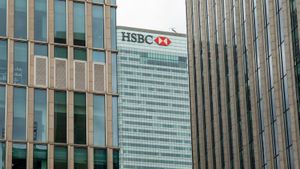Europe is on edge as the political winds shift once again, with the specter of new U.S. trade tariffs looming larger than ever. Recently, two significant figures from the European Central Bank (ECB) voiced their strong concerns over the potential economic fallout these tariffs might inflict on the eurozone. The ECB’s Vice President, Luis de Guindos, and Bundesbank President, Joachim Nagel, addressed the media to express their anxieties about the future of economic growth across Europe, underscoring the belief among experts and policymakers alike: it's the economic growth, not inflation, that's becoming the real issue at hand.
Trump’s recently updated trade policy has stirred anticipation and anxiety alike throughout global economic circles. During his previous term, the president was known for his protectionist stance, which led to significant trade tensions, especially with China. The fear now is whether his renewed commitment to tariff-heavy policies might ignite similar conflicts with Europe, potentially leading to retaliatory measures.
Speaking at events, Guindos made it clear, stating, "The balance of macro-risks has shifted from concerns about high inflation to fears over economic growth." The shift is significant and reflects widespread trepidation about how these upcoming tariffs could undermine output within the eurozone. He elaborated on the gloomy outlook, noting how uncertainties surrounding economic policy and geopolitical tensions contribute to the overall precariousness observed lately.
Backed by data and consensus from other financial leaders, Nagel echoed Guindos' sentiments during remarks made from Tokyo. He noted his view on how Trump's promised tariffs would impact international trade dynamics but emphasized he was "not overly" concerned about inflation as a direct result of such tariffs.
Nagel remarked: "Global integration would have to decrease substantially to cause a noticeable rise in inflationary pressures," highlighting the resilience of the European economic structure. He added, "And so far, we have not seen this," indicating confidence even as states prepare for potential market disruptions. Should the anticipated protectionist measures generate heightened inflation, both Nagel and Guindos seemed confident the ECB could counteract it with higher interest rates.
The reality facing the ECB is compounded by the fact it has already strategically lowered interest rates three times since June to help bolster economic recovery—an elusive goal for the 20 countries sharing the euro currency. Nagel pointed out, "We could not completely neglect output," hinting at the delicate balance policymakers must maintain between steering inflation and stimulating growth.
There's also another dimension to the conversation: the ECB's supervisory arm, led by Claudia Buch, raised alarms about how protectionist measures could disrupt growth potential across Europe. At the European Parliament, Buch cautioned, "Protectionist tendencies could disrupt the global supply chains...essential to European industries, with negative impacts on firms' growth potential, competitiveness, and financial resilience." This encapsulates the anxiety shared among central bankers and economists alike: the potential trade war between the U.S. and Europe could be costly, not just economically, but also on the frontlines of competitiveness and innovation.
Market analysts have ramped up their projections for how the new tariffs could impact the eurozone's industrial sectors, and some experts fear the fallout of Trump's continued emboldenment on trade could echo his past trade wars. The tangible worry is how trade issues from one continent can butterfly effect, influencing economies thousands of miles away. The whispers of retaliation from the European policymakers complicate the already tense economic fabric.
Despite the gloomy forecast, there’s still faith among some economists. ECB officials are optimistic, with Guindos stating he expects inflation to stabilize around the ECB’s target of 2% and urged for continued flexibility from monetary policy as economic pressures fluctuate. This sentiment reflects the broader ambition among Eurozone leaders to adapt continually to the economic circumstances described by market forces.
Overall, Europe finds itself at the precipice of significant change, grappling with the imminent impact of potential new tariffs under Trump’s administration. If the trade tensions escalate, they could alter the economic equilibrium not just within the eurozone but potentially on the global stage too. Only time will tell how the chips will fall as leaders and economists across Europe prepare for the repercussions of choices made thousands of miles away.



